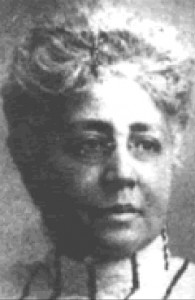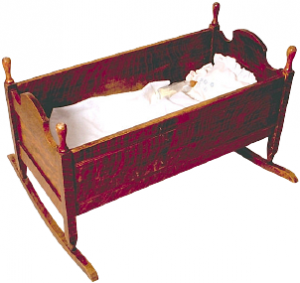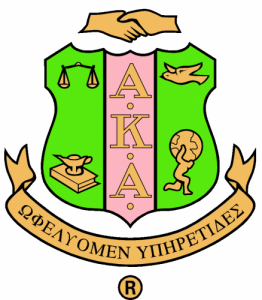Black History, Firsts, Medicine

Rebecca Lee Crumpler
Rebecca Lee Crumpler challenged the prejudice that prevented African Americans from pursuing careers in medicine to became the first African American woman in the United States to earn an M.D. degree, a distinction formerly credited to Rebecca Cole. Although little has survived to tell the story of Crumpler’s life, she has secured her place in the historical record with her book of medical advice for women and children, published in 1883.
Crumpler was born in 1831 in Delaware, to Absolum Davis and Matilda Webber. An aunt in Pennsylvania, who spent much of her time caring for sick neighbors and may have influenced her career choice, raised her. By 1852 she had moved to Charlestown, Massachusetts, where she worked as a nurse for the next eight years (because the first formal school for nursing only opened in 1873, she was able to perform such work without any formal training).
In 1860, she was admitted to the New England Female Medical College. When she graduated in 1864, Crumpler was the first African American woman in the United States to earn an M.D. degree, and the only African American woman to graduate from the New England Female Medical College, which closed in 1873. (more…)
Black History, Firsts

Sheriff Lucius D. Amerson
Sheriff Lucius Amerson’s fat Colt revolver is scarred and corroded from that night four decades ago when his patrol car crashed and burned while he chased a stolen vehicle down a winding road in rural Alabama.
His size 16 1/2 shirts, on which he would pin his badge, name plate and “sheriff” in gold letters, are creased and yellowed.
And the 1960s newspaper clippings from across the country noting Amerson’s election as the first black sheriff in the South since Reconstruction are crumbling.
But as these items sit on a table in a museum storage facility in Suitland, they conjure memories of a forgotten figure from the civil rights era, a former Army drill sergeant who strode onto the stage in the segregated South determined to show that a black lawman could provide equal justice for all.
(more…)
Black History, Firsts, Government

Henry A. Rucker
Mr. Rucker, born a slave, had been owned by the King family of Athens, Georgia (in-laws of Atlanta journalist Henry Grady). Following the Civil War, Mr. Rucker opened a barber shop on Decatur Street in Atlanta; attended Atlanta University; was a delegate to the Republican National Convention in Chicago, Illinois (1880); was appointed by the President Grover Cleveland as a clerk in the internal revenue collector’s office in Atlanta (1880-1885, 1889-1893).
He was later appointed to the position of Collector of Internal Revenue for the District of Georgia by President William McKinley. Henry Rucker was the only African American to receive such an appointment. He served from 1896 to 1910. Mr. Rucker was active in the Niagara Movement and the NAACP.
He married Annie Eunice Long (1865-1933) and had eight children: Henry, Jr., Elizabeth (Bessie), Lucy Lorene, Jefferson, Neddie, Hazel, Alice, and Ann L. The family resided on Piedmont Avenue.
Black History, Firsts, Politics

Josephine Ruffin
In 1894 Josephine St. Pierre Ruffin founded the Women’s New Era Club, a charitable organization of sixty prominent black women in Boston. Soon afterwards she began editing its monthly publication, the Women’s Era. Encouraged by the success of the New Era Club and heartened by the rapid growth of similar black women’s groups across the nation, Ruffin organized and convened the first National Conference of Colored Women at the Charles Street A. M. E. Church in Boston in 1895.
While the new organization emphasized its refusal to exclude non-black women, Ruffin nonetheless argued that African American women needed to take the leadership for their own welfare. Two years after the convention met, the National Association of Colored Women was formed with Mary Church Terrell as its first president and Ruffin as editor of the Women’s Era, now the official newspaper for the national organization.
(more…)
Black History, Firsts
 *On this date in 1606, the first recorded birth of a black child in the continental United States occurred. This was is in the Cathedral Parish Archives in St. Augustine, Florida, thirteen years before enslaved Africans were first brought to the English colony at Jamestown in 1619. ”
*On this date in 1606, the first recorded birth of a black child in the continental United States occurred. This was is in the Cathedral Parish Archives in St. Augustine, Florida, thirteen years before enslaved Africans were first brought to the English colony at Jamestown in 1619. ”
William Tucker, the first Black child born (recorded) in the American colonies, was baptized on January 3, 1624, in Jamestown, Virginia. Two of the first Africans to be brought to North America in 1619 were simply called Anthony and Isabella they were married and in 1624 gave birth to the first Black child born in English America naming him William Tucker in honor of a Virginia Planter.
After 1619, all Africans brought into the colonies were sold as slaves. Today, the black population Is over 35-million, or nearly 13-percent of the U.S. total. The largest numbers of African Americans live in New York State (more than 3-million). Other states with African American populations of more than 2-million include California, Florida, Georgia and Texas.
Black History, Education, Firsts
 The First Black Sorority was formed on the campus of Howard University. The brainchild of Ethel Hedgeman, Hedgeman approached eight other women in the Liberal Arts School and soon Alpha Kappa Alpha was established as a Greek-letter organization in 1908. Founding members included Ethel Hedgeman Lyle, Beulah E. & Lillie Burke, Margaret Flagg Holmes, Marjorie Hill, Lucy Diggs Slowe, Marie Woolfolk Taylor, Anna Easter Brown, and Lavinia Norman.
The First Black Sorority was formed on the campus of Howard University. The brainchild of Ethel Hedgeman, Hedgeman approached eight other women in the Liberal Arts School and soon Alpha Kappa Alpha was established as a Greek-letter organization in 1908. Founding members included Ethel Hedgeman Lyle, Beulah E. & Lillie Burke, Margaret Flagg Holmes, Marjorie Hill, Lucy Diggs Slowe, Marie Woolfolk Taylor, Anna Easter Brown, and Lavinia Norman.
Initially seen as a source for enhancing the social and academic life of its members, it soon expanded its horizons to include enhancing the lives of those in the community. It was the second Greek-letter group established on campus, the first being Alpha Phi Alpha Fraternity.
In 1912, the undergraduate group embarked upon a plan to take the sorority in a different direction and decided to change the name as well as the symbols associated with it. One graduate member, Nellie Quander, opposed the change. She rallied the graduates together all of whom remained firm in their commitment to Alpha Kappa Alpha (AKA). (more…)





 The First Black Sorority was formed on the campus of Howard University. The brainchild of Ethel Hedgeman, Hedgeman approached eight other women in the Liberal Arts School and soon Alpha Kappa Alpha was established as a Greek-letter organization in 1908. Founding members included Ethel Hedgeman Lyle, Beulah E. & Lillie Burke, Margaret Flagg Holmes, Marjorie Hill, Lucy Diggs Slowe, Marie Woolfolk Taylor, Anna Easter Brown, and Lavinia Norman.
The First Black Sorority was formed on the campus of Howard University. The brainchild of Ethel Hedgeman, Hedgeman approached eight other women in the Liberal Arts School and soon Alpha Kappa Alpha was established as a Greek-letter organization in 1908. Founding members included Ethel Hedgeman Lyle, Beulah E. & Lillie Burke, Margaret Flagg Holmes, Marjorie Hill, Lucy Diggs Slowe, Marie Woolfolk Taylor, Anna Easter Brown, and Lavinia Norman.